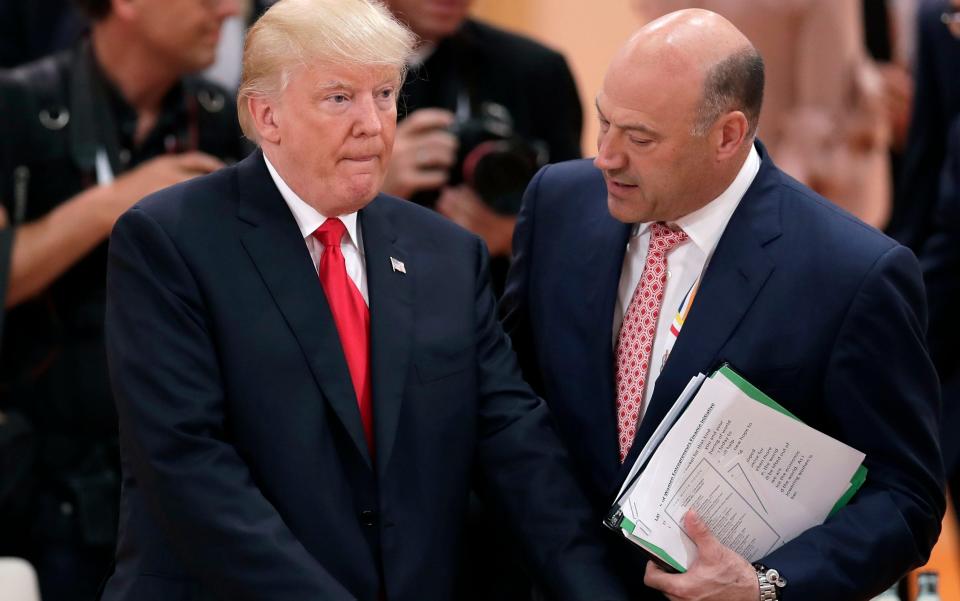Jobs week — What you need to know this week
And just like that, it’s jobs week in America again.
On Friday, the August jobs report will drop ahead of the three-day Labor Day weekend, with economists expecting another strong month from the U.S. labor market.
According to estimates from Bloomberg, Wall Street is looking for nonfarm payrolls to grow by 180,000 in August with the unemployment rate expected to stay steady at 4.3%. Brett Ryan, an economist at Deutsche Bank, wrote Friday that Amazon’s (AMZN) hiring initiative undertaken during July could skew this figure higher.

“However, offsetting this upside risk somewhat is the fact that BLS nonfarm payrolls have missed consensus expectations in August for five consecutive years—and by a meaningful amount,” writes Ryan.
Elsewhere on the calendar, we’ll have a mix of the usual data that accompanies the end-of-month transition — auto sales, manufacturing reports from Markit Economics and the Institute for Supply Management, and consumer confidence.
The earnings calendar, however, will be a bit lighter than its been in recent weeks, with results expected from Campbell’s Soup (CPB), Dollar General (DG), and Best Buy (BBY).
This past week, the economic highlight did not disappoint with Federal Reserve Chair Janet Yellen giving a speech at the annual Jackson Hole economic symposium that a number of economists interpreted as something like a farewell speech for the Chair, whose term at the helm of the central bank expires in February.

But perhaps the biggest story this week was once again Amazon, which said Thursday it would close its deal to acquire Whole Foods (WFM) on Monday after which it would cut prices on a number of items at the organ grocery chain. And while some argue this is yet another hindrance for the Fed’s inflation target, which is currently falling short of, lower grocery prices are not deflationary.
Elsewhere, oil markets were focused on the progress of Hurricane Harvey, which as of Friday afternoon was set to make landfall on the southeastern coast of Texas a category 3 hurricane, making it the first major hurricane to make landfall in the U.S. since Wilma in October 2005.
Economic calendar
Monday: Wholesale inventories, July (+0.3% expected; +0.7% previously); Dallas Fed manufacturing activity (16.8 expected; 16.8 previously)
Tuesday: S&P Case-Shiller home price index, June (+0.1% expected; +0.1% previously); Conference Board consumer confidence, August (120 expected; 121.1 previously)
Wednesday: ADP private payrolls, August (+185,000 expected; +178,000 previously); Second quarter GDP, second estimate (+2.7% expected; +2.6% previously)
Thursday: Initial jobless claims (236,000 expected; 234,000 previously); Personal income, July (+0.3% expected; 0% previously); Personal spending, July (+0.4% expected; +0.1% previously); “Core” PCE, year-on-year, July (+1.4% expected; +1.5% previously); Chicago PMI, August (58.9 expected; 58.9 previously); Pending home sales, July (+0.5% expected; +1.5% previously)
Friday: Nonfarm payrolls, August (+180,000 expected; +209,000 previously); Unemployment rate, August (4.3% expected; 4.3% previously); Average hourly earnings, month-on-month, August (+0.2% expected; +0.3% previously); Average hourly earnings, year-on-year, August (+2.6% expected; +2.5% previously); Markit U.S. manufacturing PMI, August (52.7 expected; 52.5 previously); ISM manufacturing PMI, August (56.5 expected; 56.3 previously); University of Michigan consumer sentiment, August (97.3 expected; 97.6 previously); Construction spending, July (+0.5% expected; -1.3% previously); Auto sales, August (16.6 million vehicles annualized; 16.7 million previously)
Yellen’s parting shot
This past week’s major economic event was the annual meeting of the world’s top central bankers and economists in Jackson Hole, Wyoming.
Federal Reserve Chair Janet Yellen’s speech Friday morning top billing.
And while markets didn’t react much to Yellen’s remarks, the real headlines made by the Fed chair came after Fed watchers and Wall Street economists had a minute to digest her words and came to see that Yellen was giving something of a farewell speech — and a warning to those looking to cut regulations from the financial system.
“We view the speech as a subtle shot across the bow to those in the Trump administration and Congress that would prefer to reverse many of the regulations put in place since the [financial crisis],” writes Michael Gapen, an economist at Barclays.
“[Yellen] acknowledged adjustments were needed and that process is under way, but her main message is that we need not re-learn the lessons of 2008-09 by embarking on a full-scale retracement in stronger regulations. We think a chair expecting (or desiring) another term may have put forward a different message.”
In other words, Yellen spoke like a Fed chair who knows they aren’t long for the job.
Paul Ashworth, chief U.S. economist at Capital Economics, argued Friday that, “Fed Chair Janet Yellen’s passionate defense of the post-crisis tightening of financial regulation in her Jackson Hole speech today isn’t going to go down particularly well at the White House.”
Ashworth adds that Cohn’s comments to The Financial Times published Friday — wherein Cohn actively distanced himself from Trump’s comments following this month’s tragedy at Charlottesville — “did’t necessarily do his own chances [to be Fed chair] much good today.”
This may not, however, actually dent Cohn’s chances at succeeding Yellen early next year.
“But Cohn is starting from a position of strength within the Trump administration since he is running point on tax reform which, given all the other failures, has become a must-win,” Ashworth writes. “Right now, Cohn is bulletproof.”

In February, Yellen’s four-year term at the top of the Fed will come to an end. Some time before then, President Donald Trump is expected to nominate her replacement. And while Trump has said publicly that he hasn’t ruled out re-nominating Yellen to the post, speculation has been rampant that Trump’s chief economic advisor Gary Cohn will be the next to take the top spot.
Cohn, a longtime Goldman Sachs (GS) executive before joining the Trump administration, does not have the same academic background that recent chairs Yellen, Ben Bernanke, and Alan Greenspan had. In this sense, then, a Cohn-led Fed would be something of a wild card for markets, with Cohn not steeped in the kind of academic argument that so often guides central bank thinking.
And while markets are currently focused on things like tax reform and whether or not Congress will agree on a budget that raises the debt ceiling, changes at the top of the Fed are likely to present a new — and more robust — challenge to investors.
—
Myles Udland is a writer at Yahoo Finance. Follow him on Twitter @MylesUdland
Read more from Myles here:

